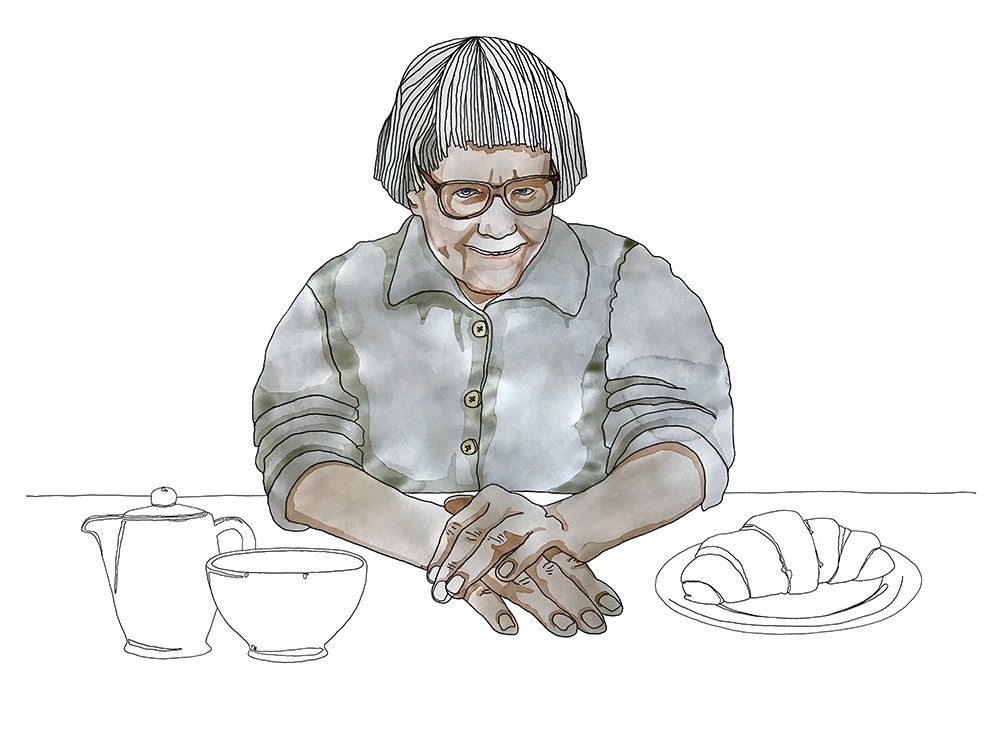Le Pain Quotidien, UN Plaza

Illustration: Forsyth Harmon
We were operating at very different speeds, you and I. The moment I saw you I felt abashed. I was hovering at the bathroom door, infuriated by its red ‘occupied’ lock, anxious and agitated before a meeting two blocks away that began in three minutes, trying not to cede to the full-bladdered indignity of actually hopping from one foot to the next, and wondering whether to knock, or how long to wait before I knocked, and how loud and peremptory to make that knock if I found the balls — the bladder? — to do it. I was here buying my way to a bathroom with an essentially unwanted cup of tea; in two and a half minutes I would be turbo-sprinting out of here, flinging this half-drunk cup into a trash bin on a corner as I went, coat flapping, ego-engined up on living one’s high-speed drama for a couple of city blocks.
You, though, were a small and still old lady bent over a table on her own. I felt there was a sanctity to this, a daily ritual. That a cup of coffee at the corner table of Le Pain Quotidien was, well, your quotidian pleasure. In short, I was here to pee, you were here to be. Your place was my convenience.
Your shapeless blue jeans were surprising. But of course you’d been young once too. Why should you wear tweed now that you were old? I could imagine you in these plain blue jeans as a thirtysomething in, say, 1965. Maybe you’d had a SoHo loft and made massive Abstract Impressionist paintings and watched your male peers ascend a ladder of back slaps and solo shows while you were dismissed and jeered at, called a crazy lesbian for your workmanlike clothes and grand aspirations. This was fanciful, I know. A full bladder has always made my imagination skitter. But whatever you’d been, you must have seen so much, because this was New York City and you were at least eighty years old. And I suspect only unconventional women wear denim at eighty.
You had white hair, bobbed short, with even shorter bangs and the effect was child-like. It was your hair that made me think of Harper Lee, specifically, the sweetly quizzical, innocent Harper Lee whose face accompanied news stories about Go Set A Watchman. I’d found that face terribly painful: it seemed to not know what had been done to it, the whole exploitative travesty of that book. But then, later, Google imaging, I couldn’t find this expression anywhere. Instead, this grid of tiles of her face on my phone screen presented someone spry and a little wicked. That firm chin, that cackle of smile revealing an upper row of tiny, cat-like teeth. I blamed an iPhone’s wonky Google image search. I had to concede, though, the more likely explanation — that back then I’d reconfigured Lee’s face each time I saw it — a sort of auto-emotive Photoshop of my own eye and brain. In other words, I’d projected on her, just as I was now projecting onto you. Swaddling you in sentiment because I was scared not just of being eightysomething, but scared, too, of now — of being thirty-two.
Just before the bathroom door finally opened I watched you prepare to get up. Your hands gripped the sides of the chair and I saw you lever yourself, the one, two, three! of propulsion — the same motions my grandmother made for the last decade of her life, maybe the same motions that every old person makes, the same motions that I’ll make, in forty or or fifty years’ time, when getting out of a chair has become a serious business. It was a practical thing, this one, two, three, but in its valiance it seemed spiritual too — like a woman crossing herself, or prayering her hands, or raising a fist in a protest, or just setting her shoulders back and inhaling — all the things women do to tell their bodies to stay strong.
A few days later, I read about the genesis of the term “empathy” — and how shocking that it was only a hundred years old. (The word of course, not the instinct) The writer and philosopher Friedrich Vischer wrote, “I seem merely to adapt and attach myself to the object as one hand clasps another, and yet I am mysteriously transplanted and magically transformed into this Other.” Vischer was talking about lifeless things, not you, but he called it Einfuhlung, or, “feeling in.” I felt you, is what I’m saying. Just for a minute or less, before I pissed and ran.
